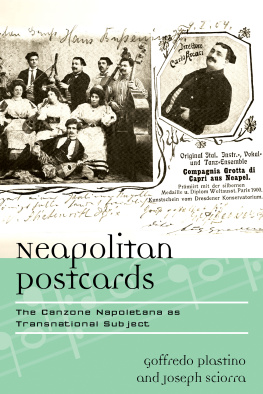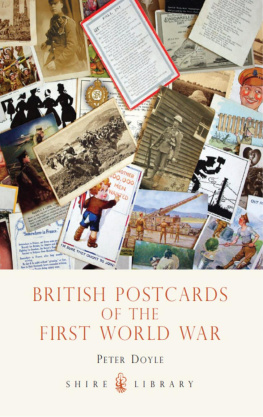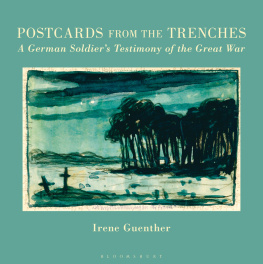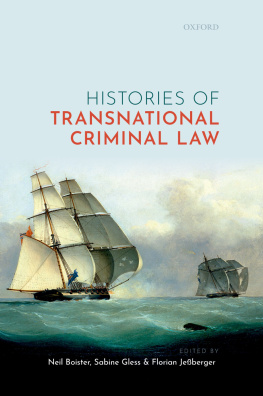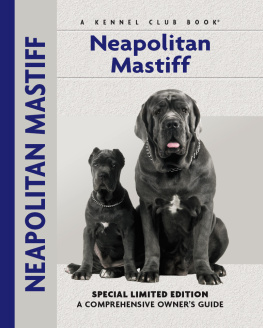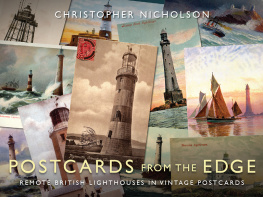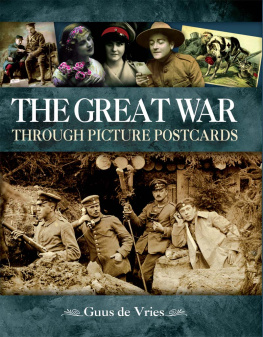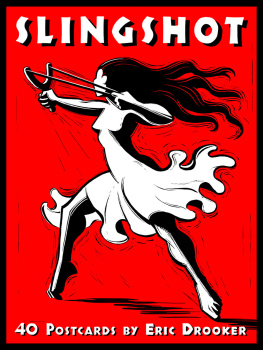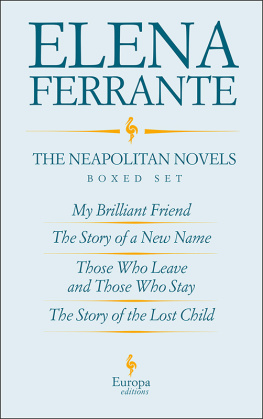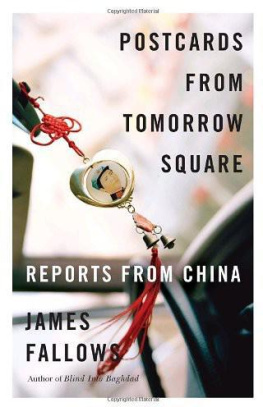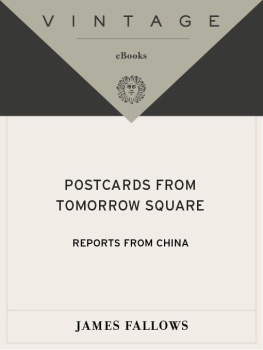Plastino Goffredo - Neapolitan postcards : the canzone napoletana as transnational subject
Here you can read online Plastino Goffredo - Neapolitan postcards : the canzone napoletana as transnational subject full text of the book (entire story) in english for free. Download pdf and epub, get meaning, cover and reviews about this ebook. City: Lanham i pozostałe, year: 2016, publisher: Rowman and Littlefield, genre: Home and family. Description of the work, (preface) as well as reviews are available. Best literature library LitArk.com created for fans of good reading and offers a wide selection of genres:
Romance novel
Science fiction
Adventure
Detective
Science
History
Home and family
Prose
Art
Politics
Computer
Non-fiction
Religion
Business
Children
Humor
Choose a favorite category and find really read worthwhile books. Enjoy immersion in the world of imagination, feel the emotions of the characters or learn something new for yourself, make an fascinating discovery.
- Book:Neapolitan postcards : the canzone napoletana as transnational subject
- Author:
- Publisher:Rowman and Littlefield
- Genre:
- Year:2016
- City:Lanham i pozostałe
- Rating:5 / 5
- Favourites:Add to favourites
- Your mark:
- 100
- 1
- 2
- 3
- 4
- 5
Neapolitan postcards : the canzone napoletana as transnational subject: summary, description and annotation
We offer to read an annotation, description, summary or preface (depends on what the author of the book "Neapolitan postcards : the canzone napoletana as transnational subject" wrote himself). If you haven't found the necessary information about the book — write in the comments, we will try to find it.
Neapolitan postcards : the canzone napoletana as transnational subject — read online for free the complete book (whole text) full work
Below is the text of the book, divided by pages. System saving the place of the last page read, allows you to conveniently read the book "Neapolitan postcards : the canzone napoletana as transnational subject" online for free, without having to search again every time where you left off. Put a bookmark, and you can go to the page where you finished reading at any time.
Font size:
Interval:
Bookmark:
Neapolitan Postcards
Europea: Ethnomusicologies and Modernities
Series Editors: Philip V. Bohlman and Martin Stokes
The new millennium challenges ethnomusicologists, dedicated to studying the music of the world, to examine anew the Western musics they have treated as traditional, and to forge new approaches to world musics that are often overlooked because of their deceptive familiarity. As the modern discipline of ethnomusicology expanded during the second half of the twentieth century, influenced significantly by ethnographic methods in the social sciences, ethnomusicologys field increasingly shifted to the exoticized Other. The comparative methodologies previously generated by Europeanist scholars to study and privilege Western musics were deliberately discarded. Europe as a cultural area was banished to historical musicology, and European vernacular musics became the spoils left to folk-music and, later, popular-music studies.
Europea challenges ethnomusicology to return to Europe and to encounter its disciplinary past afresh, and the present is a timely moment to do so. European unity nervously but insistently asserts itself through the political and cultural agendas of the European Union, causing Europeans to reflect on a bitterly and violently fragmented past and its ongoing repercussions in the present, and to confront new challenges and opportunities for integration. There is also an intellectual moment to be seized as Europeans reformulate the history of the present, an opportunity to move beyond the fragmentation and atomism the later twentieth century has bequeathed and to enter into broader social, cultural, and political relationships.
Europea is not simply a reflection of and on the current state of research. Rather, the volumes in this series move in new directions and experiment with diverse approaches. The series establishes a forum that can engage scholars, musicians, and other interlocutors in debates and discussions crucial to understanding the present historical juncture. This dialogue, grounded in ethnomusicologys interdisciplinarity, will be animated by reflexive attention to the specific social configurations of knowledge of and scholarship on the musics of Europe. Such knowledge and its circulation as ethnomusicological scholarship are by no means dependent on professional academics, but rather are conditioned, as elsewhere, by complex interactions between universities, museums, amateur organizations, state agencies, and markets. Both the broader view to which ethnomusicology aspires and the critical edge necessary to understanding the present moment are served by broadening the base on which academic discussion proceeds.
Europe will emerge from the volumes as a space for critical dialogue, embracing competing and often antagonistic voices from across the continent, across the Atlantic, across the Mediterranean and the Black Sea, and across a world altered ineluctably by European colonialism and globalization. The diverse subjects and interdisciplinary approaches in individual volumes capture something ofand, in a small way, become part ofthe jangling polyphony through which the New Europe has explosively taken musical shape in public discourse, in expressive culture, and, increasingly, in political form. Europea: Ethnomusicologies and Modernities aims to provide a critical framework necessary to capture something of the turbulent dynamics of music performance, engaging the forces that inform and deform, contest and mediate the senses of identity, selfhood, belonging, and progress that shape European musical experience in Europe and across the world.
- Celtic Modern: Music at the Global Fringe , edited by Martin Stokes and Philip V. Bohlman, 2003.
- Albanian Urban Lyric Song in the 1930s , by Eno Koo, 2004.
- The Mediterranean in Music: Critical Perspectives, Common Concerns, Cultural Differences , edited by David Cooper and Kevin Dawe, 2005.
- On a Rock in the Middle of the Ocean: Songs and Singers in Tory Island , Ireland , by Lillis Laoire, 2005.
- Transported by Song: Corsican Voices from Oral Tradition to World Stage , by Caroline Bithell, 2007.
- Balkan Popular Culture and the Ottoman Ecumene: Music, Image, and Regional Political Discourse , edited by Donna A. Buchanan, 2007.
- Music and Musicians in Crete: Performance and Ethnography in a Mediterranean Island Society , by Kevin Dawe, 2007.
- The New (Ethno)musicologies , edited by Henry Stobart, 2008.
- Balkan Refrain: Form and Tradition in European Folk Song , by Dimitrije O. Golemovi, 2010.
- Music and Displacement: Diasporas, Mobilities, and Dislocations in Europe and Beyond , edited by Erik Levi and Florian Scheding, 2010.
- Balkan Epic: Song, History, Modernity , edited by Philip V. Bohlman and Nada Petkovi, 2012.
- What Makes Music European: Looking beyond Sound , by Marcello Sorce Keller, 2012.
- The Past Is Always Present: The Revival of the Byzantine Musical Tradition at Mount Athos , Tore Tvarn Lind, 2012.
- Becoming an Ethnomusicologist: A Miscellany of Influences , by Bruno Nettl, 2013.
- Empire of Song: Europe and Nation in the Eurovision Song Contest , by Dafni Tragaki, 2013.
- Revival and Reconciliation: Sacred Music in the Making of European Modernity , by Philip V. Bohlman, 2013.
- Smi Musical Performance and the Politics of Indigeneity in Northern Europe , by Thomas R. Hilder, 2014.
- This Thing Called Music: Essays in Honor of Bruno Nettl , edited by Victoria Lindsay Levine and Philip V. Bohlman, 2015.
- Musical Exodus: Al-Andalus and its Jewish Diasporas, edited by Ruth Davis, 2015.
Neapolitan Postcards
The Canzone Napoletana as Transnational Subject
Edited by Goffredo Plastino and Joseph Sciorra
Rowman & Littlefield
Lanham Boulder New York London
Published by Rowman & Littlefield
A wholly owned subsidiary of The Rowman & Littlefield Publishing Group, Inc.
4501 Forbes Boulevard, Suite 200, Lanham, Maryland 20706
www.rowman.com
Unit A, Whitacre Mews, 26-34 Stannary Street, London SE11 4AB
Copyright 2016 by Goffredo Plastino and Joseph Sciorra
All rights reserved . No part of this book may be reproduced in any form or by any electronic or mechanical means, including information storage and retrieval systems, without written permission from the publisher, except by a reviewer who may quote passages in a review.
British Library Cataloguing in Publication Information Available
Library of Congress Cataloging-in-Publication Data
Names: Plastino, Goffredo, editor. | Sciorra, Joseph, editor.
Title: Neapolitan postcards : the canzone napoletana as transnational subject / edited by Goffredo Plastino and Joseph Sciorra.
Description: Lanham : Rowman & Littlefield, [2016] | ?2016 | Series: Europea : ethnomusicologies and modernities | Includes bibliographical references and index.
Identifiers: LCCN 2016002713 | ISBN 9780810881594 (hardcover : alk. paper) | ISBN 9780810881600 (electronic)
Subjects: LCSH: Songs, NeapolitanHistory and criticism. | Songs, NeapolitanUnited StatesHistory and criticism. | Songs, NeapolitanGreeceHistory and criticism. | Songs, NeapolitanArgentinaHistory and criticism. | Music and transnationalism. | Dissemination of music. | Italian AmericansNew York (State) New YorkMusicHistory and criticism.
Classification: LCC ML2533.8.N2 N43 2016 | DDC 782.421640945/73dc23
LC record available at http://lccn.loc.gov/2016002713
 The paper used in this publication meets the minimum requirements of American National Standard for Information SciencesPermanence of Paper for Printed Library Materials, ANSI/NISO Z39.48-1992.
The paper used in this publication meets the minimum requirements of American National Standard for Information SciencesPermanence of Paper for Printed Library Materials, ANSI/NISO Z39.48-1992.
Font size:
Interval:
Bookmark:
Similar books «Neapolitan postcards : the canzone napoletana as transnational subject»
Look at similar books to Neapolitan postcards : the canzone napoletana as transnational subject. We have selected literature similar in name and meaning in the hope of providing readers with more options to find new, interesting, not yet read works.
Discussion, reviews of the book Neapolitan postcards : the canzone napoletana as transnational subject and just readers' own opinions. Leave your comments, write what you think about the work, its meaning or the main characters. Specify what exactly you liked and what you didn't like, and why you think so.

